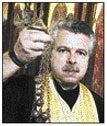
|
On Faith
Rev. Nicholas V. Gamvas
|
'Code' shouldn't shake secure Christians
IF ONE is secure in their Christian faith, then certainly a fictional novel should not be offensive.
However, Dan Brown's "The Da Vinci Code" has prompted controversial attention in the entire Christian community. It is riddled with dubious historical references that arouse intrigue in a public looking for action and the latest trend.
One of the historical characters that the author misrepresented is a canonized saint of the Orthodox Church, Constantine, whose name was given to our Orthodox cathedral in Honolulu. Tomorrow, we will celebrate his feast day on the anniversary of his death in A.D. 337.
Let us look at what is positive about the book instead of just the negative. Brown brings out a true, significant fact. In the course of Christian history, few events are larger than the Council of Nicea in A.D. 325. Roman Emperor Constantine, a newly converted Christian, called bishops from around the world to Nicea in Asia Minor, present-day Turkey, and convened the First Ecumenical Council. The church had reached monumental theological crossroads. This council produced a compilation of basic beliefs, the Nicene Creed, which is recited in Orthodox churches to this day. It is used in some form in other Christian churches as well.
BY THE TIME of Nicea, church leaders had debated the legitimacy of only a few books that we accept today in the Holy Bible. Chief among them were Hebrews and Revelation because their authorship was in doubt. Decisions of Nicea and other Ecumenical Councils were based on the teachings of the apostles, the church fathers and the oral tradition of the early church. Those witnesses have attested that Jesus Christ is divine as an equal part of the Holy Trinity, yesterday, today and forever. The claims of a modern novel or movie cannot make this false.
Many Christian leaders prepared for renewed controversy as the movie opened this weekend. Whether Orthodox, Roman Catholic or Protestant, all agree that the book and movie attacks Christianity by raising questions about Scripture and church history. Some people have not been this worked up since Jesus was depicted stepping down off the cross in Martin Scorsese's 1988 movie, "The Last Temptation of Christ."
The debate is even being colored by comparison to Muslims riots responding to Danish cartoons of the prophet Mohammed. Christian leaders are asking why Christians would be expected to sit by and watch while the media promotes a movie that insults Christianity.
IN THE United States, it seems that most Christian leaders have opted for an educational approach to "The Da Vinci Code," an opportunity to decipher what is truth and what is false. It opens the doors to the curious and the faithful to research religion and to learn more. It can give the Christian strength to challenge ourselves, our prejudices and the imperfections of humanity. It is an occasion to strengthen our faith and deepen our beliefs.
We must remember the book is a fictional expression of the author's freedom of free speech. In reality it is not shattering American Christians, leading them to waver from their churches. If anything the book and movie will call for an awareness of research for the curious and a rediscovery of faith with even deeper beliefs for the faithful.
The Rev. Nicholas Gamvas is dean of Sts. Constantine and Helen Greek Orthodox Cathedral of the Pacific in Honolulu.

